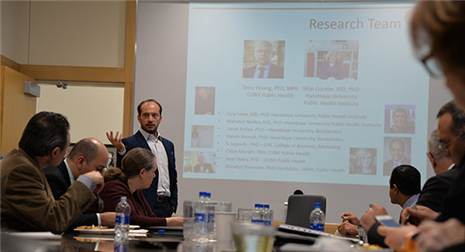
Collaboration took place on an international scale at the University of Nebraska-Lincoln College of Business in April. Dr. Ozgur Araz, associate professor of supply chain management and analytics and a Robert B. Daugherty Water for Food Institute Faculty Fellow, invited guests from the University of Nebraska Medical Center (UNMC) and from Acibadem University in Istanbul, Turkey, to Howard L. Hawks Hall. He presented his work on their project, Child Obesity Study in Ankara (COSA), a collaboration between the UNMC College of Public Health and Hacettepe University in Ankara, Turkey.
Starting the project while he was at UNMC, Araz wanted to develop an understanding of childhood obesity in an international context. Because of similar interests in early childhood development, he connected with the College of Education and Human Sciences at Nebraska and Hacettepe University. He credited their connections in Turkey that provided important data for broader analyses.
“With Hacettepe being located in Ankara, the capital of Turkey, they have good relations with the Department of Education and the Department of Health in Turkey. The infrastructure of those relationships helped us receive approval to collect data within the schools there, something not easy to do. We gained a large amount of data from the surveys we ran, which was vital to the project,” he said.
With Araz now at the College of Business, he shifted his focus to the market-based research aspect of childhood obesity. This led him to partner with Dr. S. Sajeesh, assistant professor of marketing, to study how companies should adjust their marketing strategies based on changing public health policies in Turkey and other market economies.
“When we talk about policy perception by parents, this includes food marketing. It is an important component of a complex problem. Being in the College of Business helps because of the available resources, helping us think broader and get more into business side of solving this complex problem. Sajeesh and I want to develop analytical models for food marketing strategies and look at social optimums,” he said.
Partnering with many different people and institutions, Araz recognizes the value in the collaboration that takes place in this ongoing project.
“Hearing people from different disciplines and having them bring their perspective to the issue helps move this project forward. It helps us as a university develop strong programs focused on specific areas like childhood development and obesity,” he said. “Bringing together education, public health and business allows us to study important and complex issues in the hopes that we can do something to prevent them.”